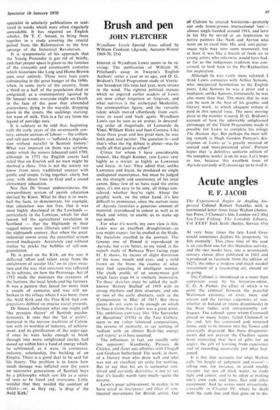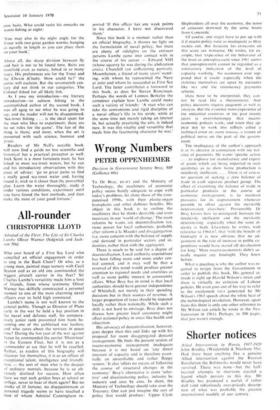Acute angles
E. F. JACOB
The Experienced Angler or Angling Im- proved Colonel Robert Venables with a testimonial letter from Isaac Walton (Antro- bus Press, 3 Clement's Inn, London wc2 40s) Sea-Trout Fishing: The Lonsdale Library, Vol XXXV Jock Scott (Seeley, Service 45s)
At very busy times the late Lord Grey would sometimes deplore his propensity `to fish mentally'. This close time of the year is an excellent one for this blameless activity, and the two books here, one a seventeenth century classic (first published in 1662 and reproduced in facsimile from the edition of 1827), the other a modern and much needed restatement of a fascinating art, should set us going.
The Colonel is introduced in a more than competent essay by his historian-editor, C. G. A. Parker, the effect of which is to point the contrast between the peaceful Waltonian existence of river, mere and stream and the furious exigencies of war, whether in Ireland or (more disastrously) in the West Indies with untrustworthy col- leagues. The colonel, upon whom Cromwell placed so many hopes, failed Cromwell in the end, left his command and returned home, only to be thrown into the Tower and practically disgraced. But these disappoint- ments did not prevent the Cheshire squire from exercising that best of gifts for an angler, the gift of learning from experience and of recording accurately just what hap- pened.
It is this that accounts for what Walton calls 'his height of judgment and reason'— telling one, for instance, to avoid muddy streams, but not all thick water, to study light and colour, and to be adept at making one's own rods and lines, flies and other equipment. And he writes most attractively, especially in Chapter IV. where he deals with the sunk line and then goes on to dis- cuss baits. Who could resist his remarks on worm fishing at night: 'You may also in the night angle for the 'I rout with two great garden worms, hanging as equally in length as you can place them on your hook.'
Above all, the sharp division between fly and bait is not to be found here. Baits are manifold even as nature, fished in so many ways. His preferences are for the Trout and the Chevin (Chub). 'How could he?' the purist will exclaim. But the seventeenth cen- tury did not think in our categories. The Colonel fished for all likely fish.
As I owe my introduction—my literary introduction—to salmon fishing to the accomplished author of the second book, I was all agog to see what he was going to say, and the reader will not be disappointed. 'Sea-trout fishing . . . is the ideal sport for the man who likes to experiment; there are no set rules for the game'. The fun of the thing is there; and most, when the art is presented with such science, humour and grace.
Readers of Mr Nall's notable book Will now find a guide no less scientific and historical but a practical preceptor as well. Jock Scott is a most fortunate man; he has fished in most sea-trout waters, but he can end his introductory observations with this piece of advice: `go to great pains to find a really good sea-trout water and, having found it, stick to it closer than the proverbial glue. Learn the water thoroughly, study it under various conditions, experiment until you have found the best methods, and then make the most of your good fortune.'



































 Previous page
Previous page